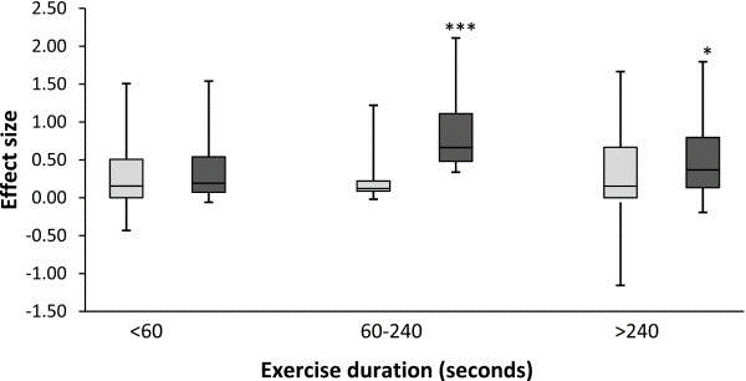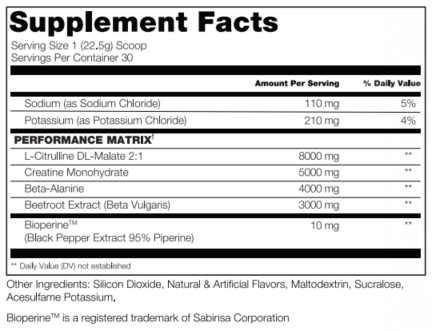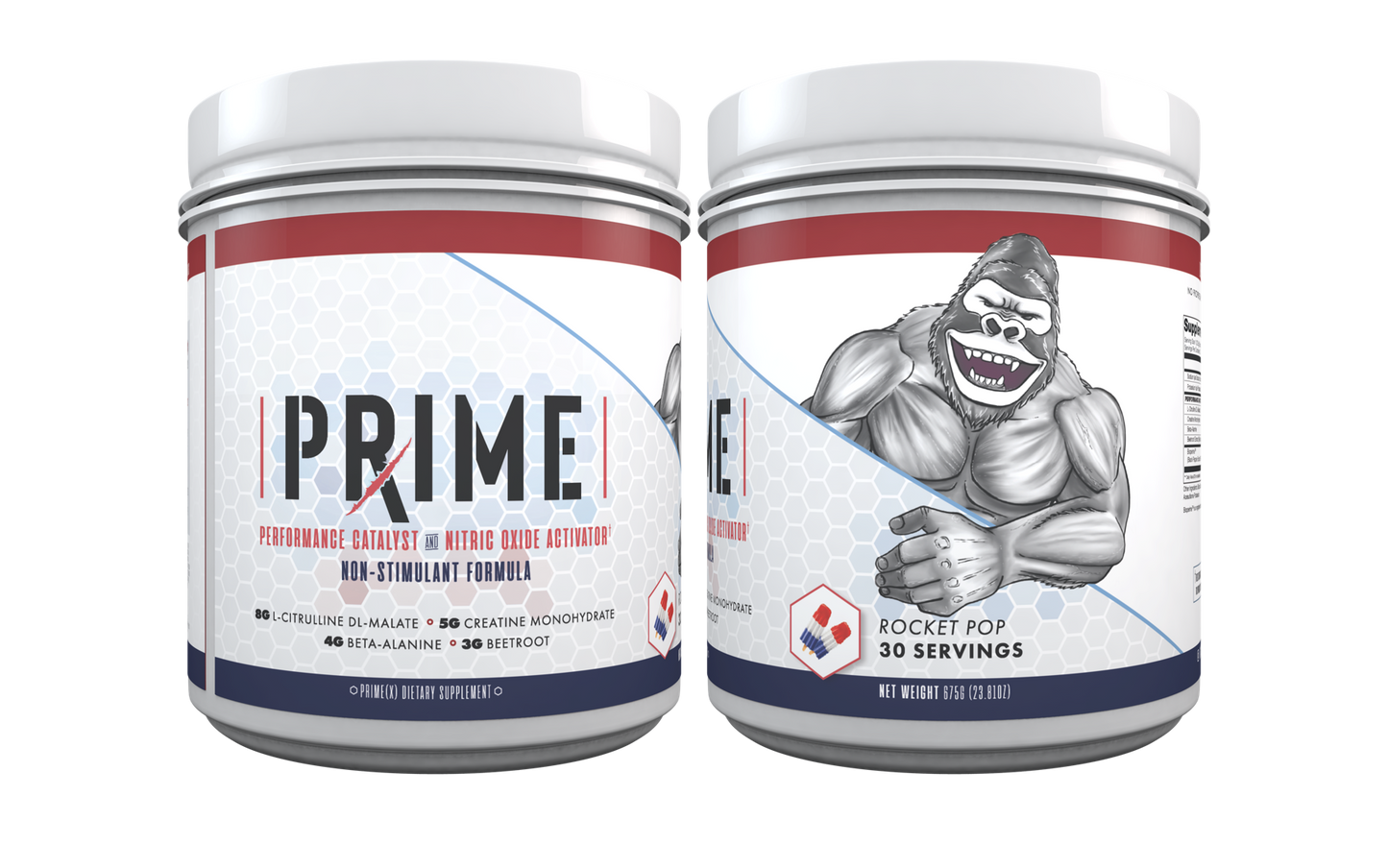Destiny Formulations
PRIME(X) - Non-Stimulant PreWorkout
PRIME(X) - Non-Stimulant PreWorkout
Couldn't load pickup availability
PRIME(X) is a preworkout supplement that helps increase strength performance, endurance, and energy, and increases blood flow to the muscles via nitric oxide production.†
PRIME(X)-Non-Stimulant offers the same performance benefits as our original preworkout formula minus the caffeine! Taurine and L-theanine are also removed from our non-stimulant formula because their benefits are based on synergistic effects with caffeine.
What's Inside?
Performance Breakdown:
- Increased blood flow ⬆
- Increased training volume ⬆
- Increased power output ⬆
- Increased aerobic exercise capacity ⬆
- Decreased fatigue ⬇
Mechanism of Action:
- Citrulline is an amino acid which, when supplemented, promotes increased nitric oxide (NO) production as byproduct of the urea cycle. Citrulline functions in this pathway as a direct precursor to the amino acid arginine, but posesses superior bioavailability, making it a more efficient nitric oxide booster. Citrulline-Malate is a combination of Citrulline with malic acid which further increases the bioavailability and absorption of Citrulline. Increased NO production leads to vasodilation along with the aforementioned performance benefits.
Read more about Nitric Oxide Boosters!
Annotated References:
- This study examined twenty-two trained males who consumed 2.4 g/day of L-Citrulline for 7 days, and on day 8 they consumed 2.4 g of L-Citrulline 1 hour before a 4-km cycling race.
- Compared to the placebo group, the group supplementing with L-Citrulline had significantly increased plasma L-Arginine levels leading to more nitric oxide production.
- The L-Citrulline group had completed the race in significantly faster times than the placebo group, while also being able to exert a higher power output.
- Subjective reports of muscle fatigue after the race were also lower for the L-Citrulline group.

Suzuki T, Morita M, Kobayashi Y, Kamimura A. J Int Soc Sports Nutr. 2016 Feb 19;13:6. doi: 10.1186/s12970-016-0117-z.
- This study examined 17 voluntary male pre-professional cyclists randomly assigned to either placebo or L-citrulline-malate groups.
- The cunjects participated in a 137-km cycling race, and blood samples were taken at basal level, 15 minutes after the race, and after 3 hours of recovery.
- The group that received 6 grams of L-citrulline-malate before the race had significantly increased plasma levels of citrulline, arginine, ornithine, urea, creatinine, and nitrite, indicating enhanced use of branched chain amino acids during exercise, and enhanced production of nitric oxide (NO).
- The L-citrulline-malate group also had a higher increase in growth hormone after the race.

Sureda A, Córdova A, Ferrer MD, Pérez G, Tur JA, Pons A. Eur J Appl Physiol. 2010 Sep;110(2):341-51. doi: 10.1007/s00421-010-1509-4.
- The purpose of this experiment was to examine the effects of Nitrosigine (Arginine) and Citrulline-Malate on vasodilation using ultrasound and flow mediated dilation (FMD).
- In this randomized, double blind study, 24 healthy and active adults (16 males and 8 females) reposrted for three seperate trials to measure vasodilation, each preceded by a 7-day washout period.
- Baseline FMD was measured following supplementation of either 8g Citrulline-Malate, 1.5g Nitrosigine (arginine), or 8g placebo (dextrose).
- Citrulline-malate supplementation resulted in the largest average increase in FMD (25%) compared to 23% for the Nitrosigine group, and -2% for the placebo group.
- This increase in vasodilation is indicative of increased skeletal muscle blood flow which results in potential improvements in exercise performance and recovery.

Rogers JM, Gills J, Gray M. J Int Soc Sports Nutr. 2020 Feb 24;17(1):12. doi: 10.1186/s12970-020-00343-y.
- This study examined the effects of a single dose of Citrulline-Malate on the performance of flat barbell bench press for 41 male subjects.
- The participants ingested 8 grams of Citrulline-Malate or a placebo 1 hour before the workout. The subjects' resistance was tested using a reps-to-failure test at 80% of their 1 repetition maximum weight for 8 total sets of bench press. (4 sets at the beginning of a chest workout, and 4 sets at the end.
- The Citrulline-malate group increased number of reps performed across 8 total sets, and achieved 52% more repetitions than the placebo group in the last set of the workout.
- The Citrulline-malate group also reported decreased feeling of muscle soreness up to 48 hours post workout.

Pérez-Guisado J, Jakeman PM. J Strength Cond Res. 2010 May;24(5):1215-22. doi: 10.1519/JSC.0b013e3181cb28e0.
Performance Breakdown:
- Increases power output ⬆
- Increases anaerobic exercise capacity ⬆
- Increases lean mass ⬆
Mechanism of Action:
- Creatine is an amino acid which, when supplemented, leads to increased intramuscluar creatine content in the form of phosphocreatine. High levels of phosphocreatine in the muscles promotes ATP regeneration for faster energy production during high intensity exercise. This efficient energy production ultimately results in increased workout volume and performance intensity.
Read more about Creatine Monohydrate!
Annotated References:
- This goal of this study was to examine how a seven-week supplementation regimen of creatine paired with resistance training affected body composition, muscle mass, muscle strength and power, and serum and muscle creatine levels in 30 non-resistance-trained males
- In this double-blind experiment, participants were randomly assigned to either Creatine Monohydrate (CRT), Creatine Ethyl Ester (CEE), or maltodextrose placebo (PLA) groups. The participants underwent a loading phase of 20 grams/day for 5 days followed by 5 grams/day for 42 days.
- Throughout the study, total serum and muscle creatine levels were higher in the CRT group compared to placebo and CEE, confirming previous research showing that Creatine monohydrate is the superious form of creatine supplementation.

Spillane M, Schoch R, Cooke M, Harvey T, Greenwood M, Kreider R, Willoughby DS. J Int Soc Sports Nutr. 2009 Feb 19;6:6. doi: 10.1186/1550-2783-6-6.
- The purpose of this study was to examine the effects of Creatine Monohydrate and polyethylene glycosylated (PEG) creatine on muscular strength, endurance, and power output.
- The study examined 58 healthy men who were randomly assigned to 1 of 4 groups; placebo (PL = 3.6 grams of cellulose), CM (5 grams of creatime monohydrate), small dose PEG creatine (1.25 grams), or moderate dose PEG creatine (2.4 grams).(
- Test results were compared before and after a 30-day supplementation period.
- Creatime Monohydrate supplementation resulted in the biggest improvements across the board, including vertical jump height, peak and mean power output, 1 repetition maximums on bench press and leg press, and repetitions to failure on bench press and leg press.

Performance Breakdown:
- Increases muscular endurance and stamina ⬆
- Increases muscular performance in the 60-240 second range ⬆
- Increases anaerobic exercise capacity and, secondarily, lean mass, while reducing fatigue ⬆
- Reduces fatigue ⬇
Mechanism of Action:
- Beta-Alanine is an amino acids which, when supplemented pairs with the amino acid Histidine to form Carnosine. As a result, increased serum and muscle Carnosine levels act as a buffer to the build-up of lactic acid in muscles. This allows for better exercise performance over time.
Annotated References:
- This study examined the efects of Beta-Alanine supplementation on physical work capacity, ventilatory threshold, maximal oxygen consumption, and time to exhaustion on an incremental cycle ergometry test.
- 22 women were randomly assigned to groups of Beta-Alanine (6.4 grams/day divided into 4 doses) or placebo supplementation for 28 days and tested before and after supplementation.
- The women supplementing with Beta-Alanine had significantly improved their physical capacity, ventilatory thershold, and time to exhaustion compared to the placebo group.

Stout JR, Cramer JT, Zoeller RF, Torok D, Costa P, Hoffman JR, Harris RC, O'Kroy J. Amino Acids. 2007;32(3):381-6. doi: 10.1007/s00726-006-0474-z.
- This study examined the effectiveness of Beta-Alanine as an ergogenic aid in tests of anaerobic power output after 8 weeks of training in 37 collegiate wrestlers (WR) and football (FB) players.
- In a double-blind manner, the subjects ingested either Beta-Alanine (4 grams/day) or placebo, and were tested before and after 8 weeks of treatment in a timed 300-yard shuttle, a 90° flexed-arm hang, and body composition.
- While the results were not statistically significant, the beta-alanine groups for both wrestlers and football players had improved their performance on all the tests, with performance improvements being greatest for the football players.

Kern BD, Robinson TL. J Strength Cond Res. 2011 Jul;25(7):1804-15. doi: 10.1519/JSC.0b013e3181e741cf.
- In this meta-analysis, a comprehansive search of literature was emplyed to gather as much reliable information about the ergogenic effects of Beta-Alanine as a performance supplement.
- Fifteen published manuscripts were includde in this analysis, reporting on the results of 57 different measures across 23 exercise tests usine 18 supplementation regimes on a total of 360 participants.
- The results indicate thet Beta-Alanine supplementation is most effective at improving performance in the 60-240 second range of exercise, while also improving performance at longer times compared to a placebo.

Hobson RM, Saunders B, Ball G, Harris RC, Sale C. Amino Acids. 2012 Jul;43(1):25-37. doi: 10.1007/s00726-011-1200-z.
- This study aimed to investigate if athlete performance is related to muscle carnosine content, and if Beta-Alanine supplementation improves performance in elite rowers.
- 18 elite Belgian rowers supplemented for 7 weeks with Beta-Alanine (5 grams/day) or placebo and were evaluated before and after treatment.
- Fundamentally, there was a positive correlation of muscle carnosine concentration with the rowers' speeds at 100m, 500m, 2000m, and 6000m.
- The rowers who supplemented with Beta-Alanine had 45% higher carnosine concentration in the soleus muscle, and 28% higher concentrations in the gastronemius muscle.
- The Beta-Alanine group was 4.3 seconds faster than the placebo group in a 2000m race, while they were actually 0.3 seconds slower before supplementation.

Baguet A, Bourgois J, Vanhee L, Achten E, Derave W. J Appl Physiol (1985). 2010 Oct;109(4):1096-101. doi: 10.1152/japplphysiol.00141.2010.
Performance Breakdown:
- Increases blood flow ⬆
- Increases training volume ⬆
- Increases power output.⬆
- Increases aerobic exercise capacity ⬆
- Decreases fatigue ⬇
Mechanism of Action:
- Beetroots are a natural dietary source of high nitrate (NO3) content. When ingested, nitrates (NO3) get reduced sequentially to nitrites (NO2) and nitric oxide (NO). Therefore, supplementation of dietary nitrates increases levels of nitric oxide (NO) leading to increased vasodilation and all the associated performance benefits of better blood flow.
Read more about Nitric Oxide Boosters!
Annotated References:
- This study examined the dose-response relationship between the volume of beetroot juice ingested and its physiological effects.
- 10 male subjects ingested 70, 140, or 280 mL of beetroot juice (containing 4.2-16.8 mmol of NO3), or NO3-depleted juice as a placebo.
- The subjects' resting plasma NO2 and NO3 levels were evaluated over 24 hours, and the results show a direct dose-dependent increase in plasma NO3 and NO2 concentrations following beetroot juice supplementation for 24 hours, indicating an increase in Nitric Oxide levels compared to the placebo groups.
- The subjects were also subjected to intense cycling exercise tests on seperate occasiond after suplmentation of beetroot juice or placebo, and showed the same dose-dependent response to beetroot juice.
- The results also showed a 12-14% increse in time to exhaustion for the beetroot group, while actually decreasing their steady-state oxygen uptake. This indicates an incresed efficiency of oxygen utilization after beetroot supplementation.

Wylie LJ, Kelly J, Bailey SJ, Blackwell JR, Skiba PF, Winyard PG, Jeukendrup AE, Vanhatalo A, Jones AM. J Appl Physiol (1985). 2013 Aug 1;115(3):325-36. doi: 10.1152/japplphysiol.00372.2013.
- This study investigated the effects of acute dietary nitrate supplementation on power output, VO2, and performance during 4 km and 16.1 km cycling time trials.
- 9 elite male cyclists were assigned randomly to consume either 500 mL of beetroot juice or a nitrate-depleted placebo juice before completing either 4 km or 16.1 km time trials.
- The group consuming beetroot juice significantly increased the mean power output during both 4 km and 16.1 km races. Beetroot juice supplementation also resulted in a 2.8% performance increase in the 4 km race, and a 2.7% performance increase in the 16.1 km race.

Lansley KE, Winyard PG, Bailey SJ, Vanhatalo A, Wilkerson DP, Blackwell JR, Gilchrist M, Benjamin N, Jones AM. Med Sci Sports Exerc. 2011 Jun;43(6):1125-31. doi: 10.1249/MSS.0b013e31821597b4.












